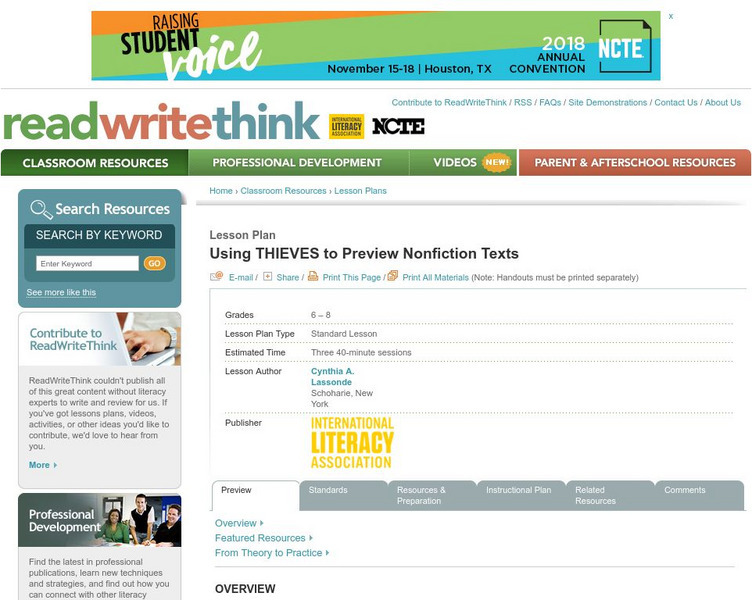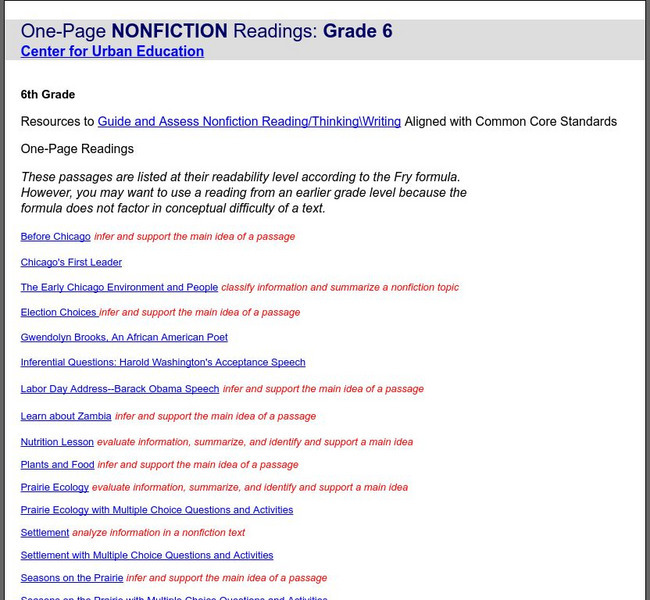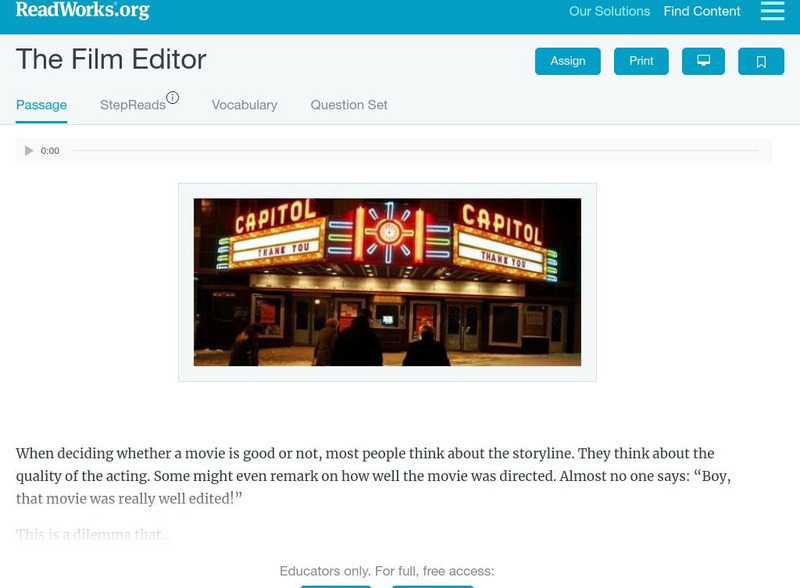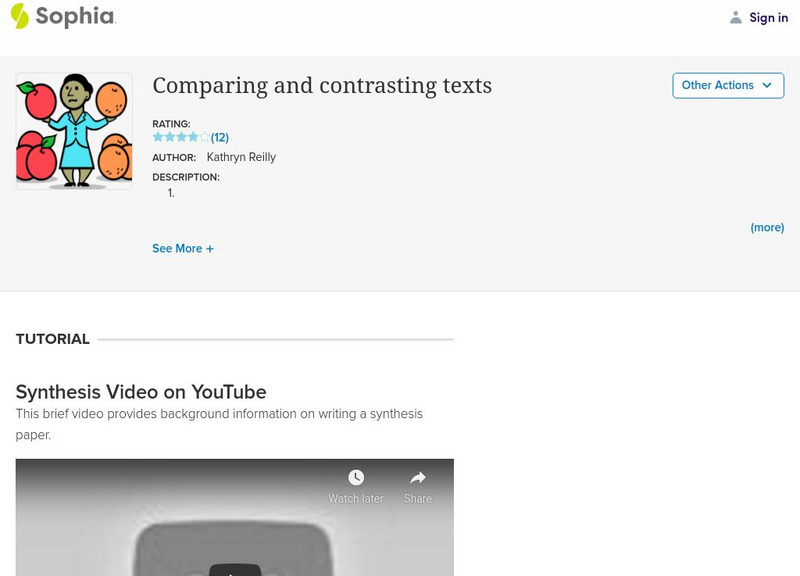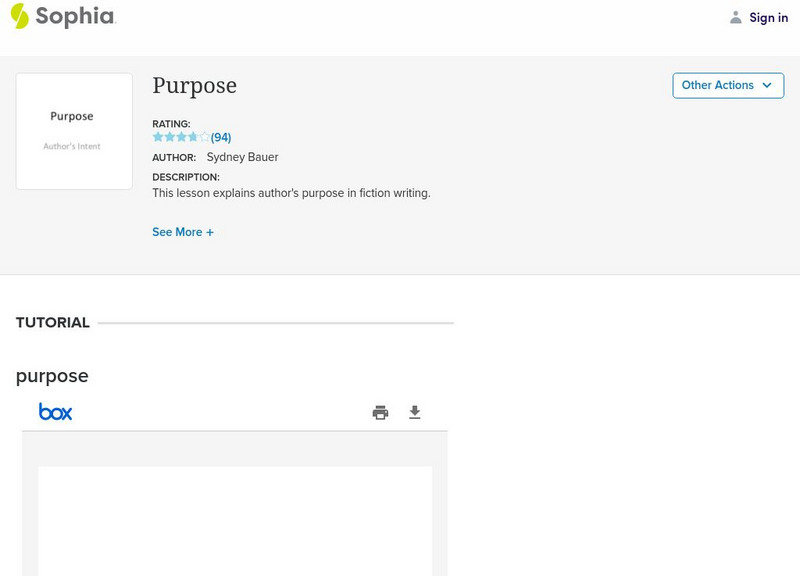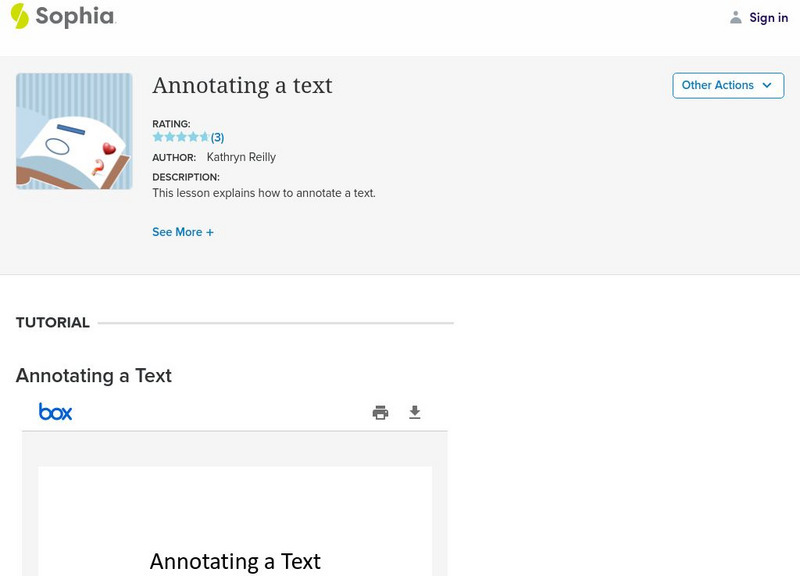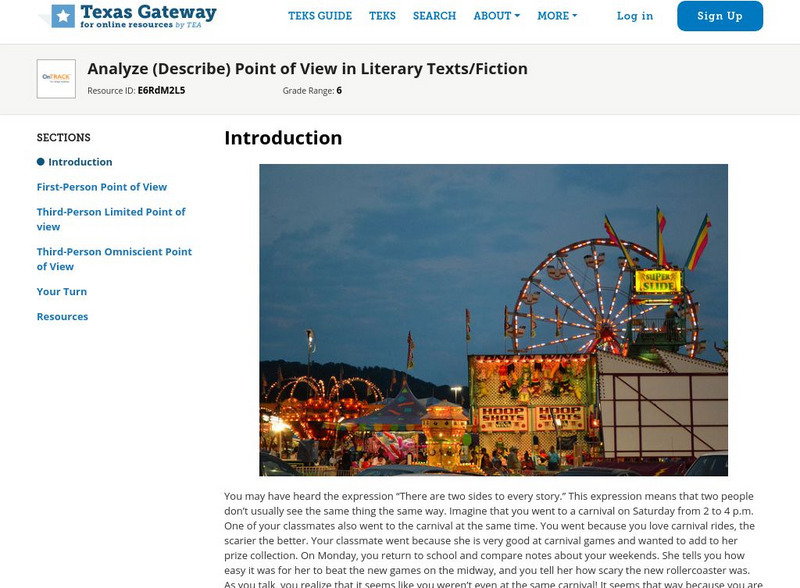Tallahassee Community College
Finding the Main Idea
A short excerpt at the beginning of the sheet provides middle schoolers with questions to think about when looking for the main idea. Followed by that, learners respond to four reading passages by answering multiple choice questions.
Curated OER
Fact and Opinion
Sixth graders discuss the terms "explicit opinions," and "implicit opinions," from a text. In this literacy lesson, 6th graders analyze the author's techniques to find explicitly stated opinions. Additionally, students complete a...
PBS
Pbs Learning Media: Walmart Middle School Litercy Initiative
Interactive, student-paced lessons on such literacy skills as categorizing, comparing and contrasting, summarizing, evaluating, determining cause and effect, using text features, connecting, inferring, sequencing, understanding problems...
SUNY Empire State College
Empire State College: Shaping Information: Ordering Information and Outlining
Discusses finding a logical order for the ideas you wish to present in your essay. Uses samples to show how changing the position of the topic sentence changes the emphasis. Briefly touches on transitions. Then discusses the outline as...
Polk Brothers Foundation Center for Urban Education at DePaul University
De Paul University: Center for Urban Education: Nonfict Readers Analyze Structure/views[pdf]
This graphic organizer contains questions for students as they analyze any nonfiction text. Students will read closely to determine the text's structure, viewpoint, and tone. This graphic organizer is a copyrighted material that may be...
Polk Brothers Foundation Center for Urban Education at DePaul University
De Paul University: Center for Urban Education: Comprehensive Questions: Nonfiction [Pdf]
Questions are provided to help students determine the main idea, topic, and fact versus opinion of a nonfiction piece. Students are prompted to write a summary of an informational text.
Other
Curriculum Associates: Determining Theme or Central Idea [Pdf]
In this reading comprehension lesson unit, students are guided in learning how to find the main theme or idea of a text and understanding how details in the text convey that. Includes lots of exercises and examples, as well as...
ReadWriteThink
Read Write Think: Using Thieves to Preview Nonfiction Texts
Contains plans for three lessons that introduce a nonfiction prereading strategy with the acronym THIEVES, which stands for Title, Headings, Introduction, Every first sentence, Visuals and vocabulary, End Questions, and Summary. In...
ReadWriteThink
Read Write Think: Expository Escapade: Detective's Handbook
Working on higher-level thinking skills with your readers is made easier with this lesson. You will have your students connect with and analyze a mystery story at their grade-appropriate level. Lesson plan, printable worksheets, and...
ReadWriteThink
Read Write Think: Playing With Genre Through Newspapers and Short Stories
Contains plans for three lessons that ask students to compare narrative writing (short stories) to expository writing (news articles) in order to understand what makes each genre unique. In addition to objectives and standards, this...
Other
Academic Reading: Sample Task [Pdf]
This Academic Reading task provides a practice assessment for identifying headings and subheadings. In the task, students must read the selection and then determine the best subheading for each of the sections.
Polk Brothers Foundation Center for Urban Education at DePaul University
De Paul University: Center for Urban Education: One Page Nonfiction Readings: Grade 6
This site contains 17 nonfiction articles that are appropriate for students with a 6th grade reading level, as measured by the Fry Formula. Questions for each passage are provided. Graphic organizers are available for these copyrighted...
University of Houston
University of Houston: Extra! Extra! What's the Big Idea?!
Get the feel of running a newspaper by selecting articles and pictures. If you are interested in checking out real newspapers, there is a clickable list of online newspapers for younger readers.
Annenberg Foundation
Annenberg Learner: Conversations in Literature
A research based workshop by Judith Langer on bringing the joy of reading literature to your class. An excellent professional development resource, with eight videos on demand. Topics include Responding as Readers, Objectifying the Text,...
Read Works
Read Works: Passages: The Mountain
[Free Registration/Login Required] Students read a fiction text about an unexpected love and answer questions about comprehension, setting, vocabulary, transitions, and more. A paired text and questions are also available.
Read Works
Read Works: Passages: The Film Editor
[Free Registration/Login Required] Students read a nonfiction text about the job of a film editor and answer questions about comprehension, supporting details, inferencing, main idea, and more. Links to a paired text and paired text...
Read Works
Read Works: Passages: The Process of Acting
[Free Registration/Login Required] Students read a nonfiction text about what it takes to be an actor and answer questions about comprehension, main idea, supporting details, vocabulary, transitions, and more. Links to a paired text and...
Sophia Learning
Sophia: Comparing and Contrasting Texts
This tutorial focuses on writing a comparison and contrast paper for both literary texts and informational texts. It offers a YouTube video about writing a synthesis paper using either a point by point or a source by source arrangement....
Sophia Learning
Sophia: Purpose
This slideshow lesson focuses on purpose; it defines purpose and lists the two main purposes of all writing: to educate (didactic text meaning to inform and instruct) or to entertain (imaginative text). The purpose could also be art for...
Sophia Learning
Sophia: Annotating Text
This slideshow focuses on the reading strategy, annotating text. It defines the term and purpose, lists types of annotation, explains what to annotate, and suggests how readers develop their own method.
Sophia Learning
Sophia: Critical Reading as a Learning Strategy
This tutorial focuses on critical reading using a downloadable PowerPoint presentation, "Critical Reading 101," which includes separating fact from opinion, 6 propaganda techniques, and 6 common fallacies in reasoning. Also provided is...
Texas Education Agency
Texas Gateway: Themes in Literary Texts (English 6 Reading)
Learn how to infer the implicit theme in a work of fiction, distinguish theme from topic, and make complex inferences using textual evidence.
CommonLit
Common Lit: Where Did I Come From
CommonLit.org is a wonderful resource to use in a Language Arts classroom. Each story or article is accompanied by guided reading questions, assessment questions, and discussion questions. In addition, students can click on words to see...
Texas Education Agency
Texas Gateway:analyze (Describe) Point of View in Literary Texts/fiction
In this learning module, students will learn to analyze fiction told from the first-person, third-person limited, and third-person omniscient points of view.






